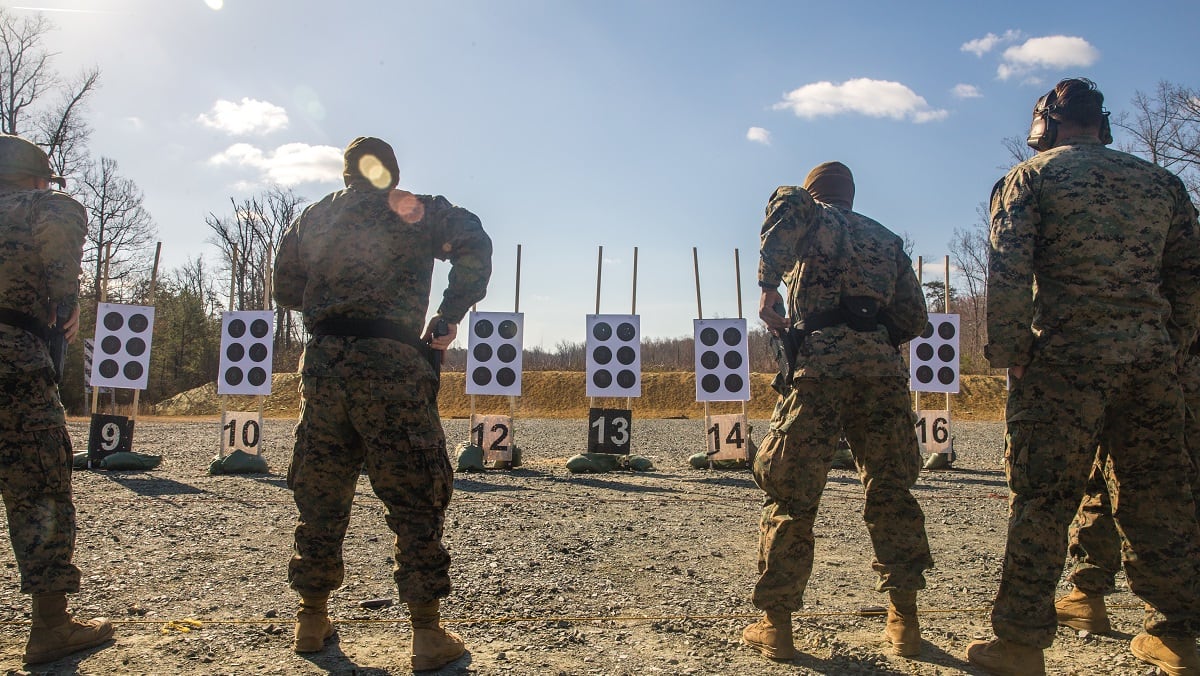The Marine Security Guard Augmentation Unit is on track to execute a full load of deployments for the first time since the start of the COVID-19 pandemic.
And as the unit matures, other Marine elements are starting to take greater notice of its work.
“We are on track to execute approximately 70 missions this year, which will return us to our operational tempo pre-COVID levels,” Col. Kelly Frushour, commanding officer of Marine Corps Embassy Security Group, told Marine Corps Times in an interview.
Frushour, a career public affairs officer, became the first woman to lead the Marine Corps Embassy Security Group when she took command in June.
RELATED

Pandemic travel restrictions and host country limitations had severely curtailed the Marine Security Guard Augmentation Unit’s typical high deployment tempo.
The unit, established in 2013 following the deadly attack on the U.S. consulate in Benghazi, Libya, exists to shore up embassy security amid threat or unrest.
But 13-Marine teams also regularly deploy to embassies ahead of VIP visits and to conduct proactive security validation assessments. In a typical year, teams are deploying almost constantly to augment the 183 Marine security detachments at embassies in 148 countries.
“The average dwell time between MSAU missions is about seven-and-a-half days,” Frushour said.
From a high of 92 missions in 2017, however, Marine Security Guard Augmentation Unit teams did just 22 in 2020 as COVID-19 swept the world.
In 2021, Frushour said, the Marine Security Guard Augmentation Unit had 36 deployments. The unit has surpassed that number already in 2022.
To date, Marine Security Guard Augmentation Unit teams have deployed nearly 500 times since the unit stood up, with larger contingents pushing out to support embassy evacuations or to ramp up security in places with threats of violence.
In 2016, a 40-Marine contingent pushed out to Juba, South Sudan, as the embassy evacuated nonessential staff amid threats of a civil war.
Marine Security Guard Augmentation Unit Marines, who differ from Fleet Antiterrorism Security Teams (FAST) in that they’re considered diplomatic assets and directly responsive to the needs of the State Department, do receive more training than regular Marine Security Guard watchstanders, which has provided the chance to stay busy during the deployment slump.
Marine Security Guard Augmentation Unit-assigned Marines get seven extra weeks in of training in marksmanship, medical skills, communication and tactics, as well as a two-week collective training cycle at the Foreign Affairs Security Training Center in Blackstone, Virginia, which includes the Department of State’s High Risk Environment Firearms Course and enhanced room clearing.
They’re also offered the chance to take seven optional advanced individual skills courses in topics such as foreign weapons instruction, survival, evasion, resistance and escape, or SERE, and counter-threat driving.
As the unit approaches its ten-year anniversary, the Marine Security Guard Augmentation Unit is becoming a more well-known and established capability inside the Marine Corps ― and that’s leading to better collaboration with other units who have been less familiar with what it offers in the past.
In particular, Frushour said, she is seeing the leaders of deployed Marine Expeditionary Units pay more attention to when Marine Security Guard Augmentation Unit teams are dispatched in their region.
“If MSAU is getting sent somewhere, it can be an indicator of things maybe not going well in that part of the world, and [a MEU commander] can put folks on alert: ‘Hey, this is going on, we might have to go do something to help,’” Frushour said. “So more units are starting to use MSAU deployments as an information requirement to prepare for what they might get asked to do.”
Marine Security Guard Augmentation Unit and the larger embassy security group have also been conducting more integrated training with a range of units from Marine Expeditionary Operations Training Groups to MEUs and diplomatic security and foreign affairs personnel.
“Considering recent events with Kabul and Kyiv, it is increasingly critical to reinforce and rehearse our interagency interoperability,” Frushour said. “While our core training and readiness focuses on the MSG mission that enables them to stand ‘Post One’ and all other mission specific posts while reacting to emergencies and threats, our headquarters has coordinated valuable engagements with the interagency and joint force in training, mission rehearsal exercises, and deployment certifications.”
While normal operations have largely resumed for all Marine security guards, there are still a few nations and diplomatic locations, largely in the Pacific, that don’t allow region commanders to visit deployed Marine security detachments. Typically, detachments get several visits per year, which gives Marines the chance to bring up concerns and get direct mentorship.
One regional commander, Frushour said, had magnets made and distributed to his Marines containing a QR code with his contact information and a promise that he’d answer any request within 24 hours.
“I think that was really well received there,” she said. “So there has been some creativity in making sure that Marines know that, even though we’re not physically there, you’re still in our thoughts on a daily basis … our entire purpose in life is making sure that they are set up to do this mission that we have assigned them to do.”




